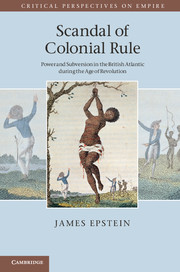‘In this this rollicking, sensational tale of imperial misrule, James Epstein takes readers into the colonial underworld peopled by those rogues and scoundrels who both represented British colonial power and defied it … Drawing on legal records, parliamentary debate, personal memoirs, print culture and the uneven, fragmented remains of the colonial archive, he weaves together the fractious histories of Thomas Picton and William Fullarton, suturing their clash of wills to the most important questions of the day: the rule of law, the fate of free labor and the career of liberalism in and outside the metropole … Epstein never lets the men and women of color whose suffering was the scandal of colonial rule fall below our sightline … postcolonial history at its best: erudite, breathtaking, subversive - and portable … to a host of other imperial times and places …’
Antoinette Burton - University of Illinois, Urbana-Champaign
‘Britain’s newly acquired colony of Trinidad was, at the dawn of the nineteenth century, awash with migrants and refugees … its stability poised insecurely between the enslaved demands for freedom, and the repression which was the shank of colonial and plantocratic rule. The Governorship of Thomas Picton - violent, dictatorial and torturing - brought to a head … wider debates about colonial law and order, and about British governance on the far edges of empire. Through his clever use of archival materials, on both sides of the Atlantic, James Epstein weaves a compelling tale of popular demands for freedom and justice in the teeth of colonial brutality. [This book] offers, via a tantalising snapshot of a one slave colony, a broad panoramic survey of the world of Atlantic slavery - indeed of global domination - in the last phase of Britain’s eighteenth-century empire.’
James Walvin - University of York
‘James Epstein is a distinguished scholar writing at the peak of his powers. In this masterful book he gives vital new meaning to the old maxim, so much of British history happened overseas.’
Marcus Rediker - Distinguished Professor of Atlantic History, University of Pittsburgh
‘Louise Calderon was an obscure mixed-race woman of dubious virtue living in Trinidad in the early nineteenth century whose torture led to a famous imperial scandal. James Epstein's remarkable new book shows how this scandal, in his sensitive hands, can illuminate both Louisa's brief moment of notoriety and, more importantly, the strange world of the British empire at its imperial meridian. Based on a wealth of archival research, Epstein reveals an imperial world of startling brutality and disturbing modernity, a world in which both liberalism and authoritarianism were in uneasy and fascinating juxtaposition. A rollicking good read with profound implications.’
Trevor Burnard - University of Melbourne
'James Epstein’s Scandal of Colonial Rule reminds us of just how compelling history can be. Epstein centers his work on the story of Louisa Calderon, a mixed-race woman who was tortured by the first British governor of Trinidad, General Thomas Picton, in 1801 in order to force her to admit to her alleged role in a robbery. From this core narrative, and the debates it engendered, he leads us in a dazzling array of directions, demonstrating a mastery of social, cultural, political, gender, legal and imperial history along the way. What emerges is a nuanced and kaleidoscopic view of the British Empire in the decades around 1800, when the British were still grappling with their new global power. This is history simultaneously revelatory and readable, as Epstein leads his readers through a world in which very little was fixed and much was in flux, never losing his footing.'
Source: North American Conference on British Studies
'In this powerful and stimulating book, Epstein … contributes significantly to the rethinking of the relationship between [the] British Empire and its colony of Trinidad. Closely connecting the imperial metropolis with the colony, [he] insightfully explains what imperial Britain meant for those at home, as well as for the travelers in the British Atlantic world. Anyone interested in British self-constructions both in the colonies and at home will profit from a careful study of this book.'
Tao Wei
Source: International Journal of Maritime History
‘This is a fine work of history: deeply researched, beautifully written, suspenseful, and full of insight into the working of colonial rule and colonial violence in the period it examines.’
Diana Paton
Source: Social History
'Questions about the way that colonial law fit with metropolitan law, about the different meanings of race and gender in mostly white England and in its mostly nonwhite colonies, and about who could lay legitimate claim to the status of subject of the crown, and what that status offered were not amenable to a single clear answer. Instead they took shape in a response to different contingencies as the center spoke to its peripheries and, to borrow a famous formulation, the empire spoke back. James Epstein has offered a wonderful case study of that process, a case study that speaks to important questions about the meanings of empire in the nineteenth century while casting important if indirect light on the uncomfortable workings of empire today.'
James Sidbury
Source: Journal of Modern History



